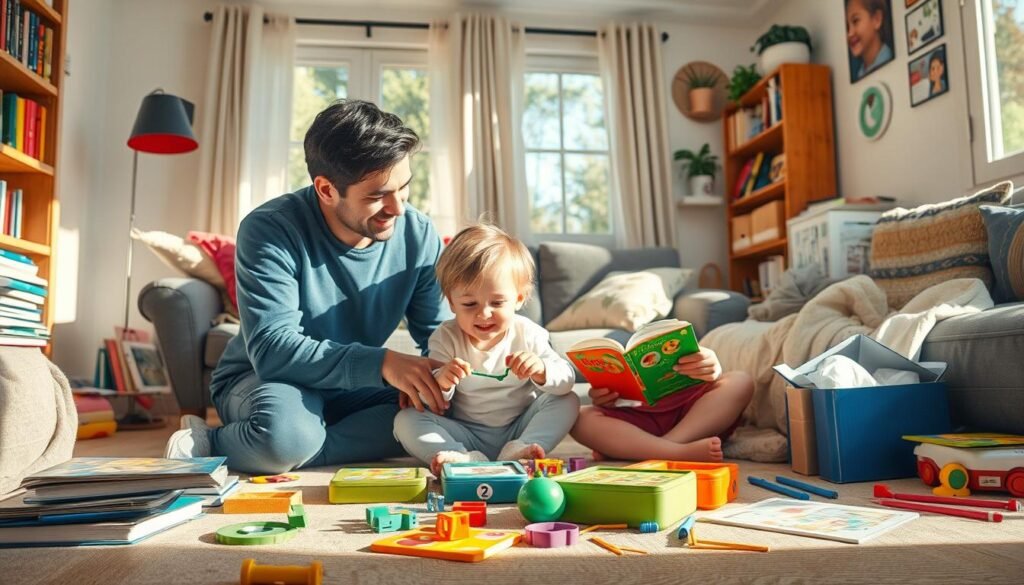As a parent, you might wonder what positive parenting tips can help your child grow during middle childhood. This stage is key for development, with most kids improving how they interact with friends1. You’re looking for ways to support your child’s growth in social, emotional, and physical areas. Plus, you want to teach them important life skills.
Positive parenting can cut down on bad behavior by up to 30% in kids aged 6-81. This makes it a vital part of parenting during middle childhood.
At this age, kids spend about 25 hours a week watching screens. This can affect their social and physical growth1. It’s important to balance screen time with other activities that support healthy development. By using positive parenting tips, you can lay a solid foundation for your child’s future success and happiness.
Key Takeaways
- Positive parenting practices can reduce behavioral issues by up to 30% in children aged 6-81.
- Approximately 70% of children display improved interactions with peers during middle childhood1.
- Children in this age group typically spend around 25 hours a week engaging in screen time1.
- Positive parenting tips can help your child develop essential life skills and a strong foundation for future success.
- What are two positive parenting tips for middle childhood 6-8 that can help your child thrive during this critical stage of development?
- Positive parenting tips are essential for middle childhood parenting advice, as they can help reduce behavioral issues and promote healthy development.
- By following effective positive parenting tips, you can help your child develop a strong foundation for future success and well-being.
Understanding Middle Childhood Development Stages
Parenting is a journey filled with learning about your child’s growth stages. Middle childhood, from ages 6-8, is a key time for kids. They grow a lot, getting smarter, better at social skills, and more physically able2.
Some important milestones in middle childhood include:
- Improved communication skills, with children learning around 20 new words per day3
- Enhanced cognitive understanding, with children able to group objects by size, shape, and color3
- Increased independence, with children showing significant independence from parents2
As a parent, knowing these changes is vital. You need to adjust your parenting to support your child’s growth. This means nurturing them aged 6-8 and giving them chances to grow socially and emotionally. Activities like physical play and playing with friends are great2. By understanding these stages, you can meet your child’s needs and help them succeed.
The Impact of Positive Parenting on Child Development
As a parent, you have a big role in shaping your child’s behavior and well-being. Using positive parenting tips and effective parenting strategies helps promote good behavior in your child. Studies show that kids who get positive feedback from parents are 30% more likely to act kindly than those who don’t4.
Positive parenting can boost your child’s self-esteem and social skills. It also helps them understand their emotions better. By setting clear rules and sticking to them, you can cut down bad behavior by up to 50% in kids4. Also, kids who help out at home and do family activities become more self-reliant by age 84.
Here are some key points to consider when using effective parenting strategies:
- Encourage open communication to promote a positive self-image
- Set clear rules and consequences to reduce problematic behavior
- Engage in family activities to promote self-reliance and responsibility
By following these tips and usingpositive parenting tips, you can help your child grow into a happy and well-adjusted person. Remember,promoting positive behavioris a long-term effort that needs patience, consistency, and dedication5.
| Age | Physical Development | Social-Emotional Development |
|---|---|---|
| 6-8 years | Grow about 2.5 inches (6-7 cm) per year6 | Develop strong friendship skills with consistent parental support4 |
Understanding how positive parenting affects child development helps you make better choices in parenting. Always use positive parenting tips and effective parenting strategies to help your child grow healthily5.
What Are Two Positive Parenting Tips for Middle Childhood 6-8
As a parent, you have a big role in your child’s growth from 6 to 8 years old. Raising children 6-8 means knowing what they need and using good parenting methods. Two key tips are to talk often and have routines that can change a bit.
Talking often helps build trust and lets your child share their thoughts. Set aside time to talk, listen well, and guide them when needed. Studies show this can help them do better in school and feel better emotionally7.
Having routines but being flexible is also important. Create a daily plan for homework, play, and rest, but be ready for surprises. This helps your child feel responsible and disciplined. The American Academy of Pediatrics says kids this age should move at least 60 minutes a day for health8.
- Encourage open communication and active listening
- Establish clear boundaries and consequences
- Provide opportunities for physical activity and outdoor play
- Support cognitive development through reading and educational activities
Using these tips can help your child be happy, healthy, and well-adjusted. Be ready to change your approach as they grow. Always talk to doctors if you worry about your child’s growth9.
| Age | Cognitive Development Milestones | Social-Emotional Development Milestones |
|---|---|---|
| 6-8 years | Improved problem-solving skills, enhanced memory and attention | Developing empathy, forming friendships, and learning to cooperate with others |
Implementing Effective Communication Strategies

As a parent, you are key in shaping your child’s communication skills. Effective parenting strategies can really help. For kids aged 6-8, understanding their growth stages is vital. Studies show that about 68% of communication comes from reading, making it a key part of our lives10.
To improve communication, try these tips:
- Practice active listening by giving your child your full attention
- Use empathy and validation to create a safe and supportive space
- Encourage open and honest talk by asking open-ended questions
By using these strategies, you can help your child improve their communication skills. This will also strengthen your bond with them. For more parenting tips, check out essential tips for parenting your teenager. Remember, nurturing children aged 6-8 needs patience, understanding, and flexibility10.
By focusing on middle childhood parenting advice and using effective parenting strategies daily, you can help your child grow into a confident and capable person. Don’t overlook the importance of good communication in shaping your child’s future11.
Building Strong Emotional Bonds During Middle Childhood
Parenting is a journey where promoting positive behavior and building a strong bond with your child is key. During middle childhood development, kids grow a lot, getting taller and heavier. They also start to develop motor skills needed for sports and physical activities12. It’s important to create a supportive environment that encourages open communication and emotional intelligence.
Studies show that positive parenting can boost a child’s self-esteem and emotional intelligence by up to 30%12. By being supportive, kids become more independent and responsible, completing tasks at home 25% better12. Regular talks, like morning routines and bedtime discussions, can make kids 15% more emotionally resilient12.
To strengthen emotional bonds, try these strategies:
- Practice active listening to enhance parent-child relationships
- Engage in quality time activities that promote emotional intelligence and social skills
- Use emotional validation methods to help children understand and manage their emotions
These strategies can help you build a positive relationship with your child. This can improve their emotional intelligence, self-esteem, and social skills13. Also, make sure to have tech-free zones to increase family interactions and face-to-face communication, which is good for emotional development12.
| Strategy | Benefits |
|---|---|
| Active Listening | Enhances parent-child relationships, increases empathy |
| Quality Time Activities | Promotes emotional intelligence, social skills, and self-esteem |
| Emotional Validation | Helps children understand and manage their emotions, leading to improved emotional resilience |
By following these tips and paying attention to your child’s emotional needs, you can help them grow into a confident, empathetic, and well-adjusted person14.
Creating Age-Appropriate Boundaries and Consequences
Setting clear boundaries and consequences is key in middle childhood parenting advice. Parenting tips for 6-8-year-olds stress the need for consistency and fairness. Research indicates that defiant behavior is common in kids aged 6-9, as they learn to express their thoughts better15. They often test limits, leading to more arguments and competition15.
To set effective boundaries, consider these tips:
- Set clear rules and expectations
- Maintain a positive and supportive relationship with your child
- Use logical consequences linked to the behavior, not punishments15
By following these parenting tips for 6-8-year-olds, you can create a better environment for your child. Focus on positive behaviors and use time-out as a cool-down, not a quick punishment15. With consistency, patience, and positive reinforcement, you can help your child develop important life skills and a strong sense of responsibility. This makes raising children 6-8 a more enjoyable and rewarding experience.
Experience is a powerful teacher; children are more likely to remember natural consequences more than verbal reminders15.
Fostering Independence While Maintaining Support
As a parent, finding the right balance is key. You want to give your child freedom and support them at the same time. This is very important when they’re around 6-8 years old. At this age, they start to want more independence from their family16. Using effective parenting strategies helps them grow into confident, self-reliant kids.
It’s important to let your child make their own choices. This could be what to wear or what game to play. It helps them learn to solve problems and take responsibility for their actions. Teaching them how to solve problems can make them more independent16. For more on child development, check out this resource on nurturing children aged 6-8.
Here are some ways to encourage your child’s independence:
- Let them take care of their own needs, like dressing and feeding themselves
- Give them chances to make choices and take risks
- Teach them how to solve problems
- Support them while also letting them make their own decisions
By following these tips, you can help your child become more independent and confident. Always be there to support and guide them. But also let them make their own choices and learn from their mistakes16.
| Age | Independence Level | Parenting Strategy |
|---|---|---|
| 6-8 | Begin to show more independence | Encourage decision-making skills, teach problem-solving strategies |
| 9-11 | Form stronger, more complex friendships | Provide opportunities for socialization, teach emotional intelligence |
| 12-14 | Emotional concerns about body image and self-esteem | Offer support and guidance, encourage open communication |
Balancing Academic Support with Play-Based Learning

As a parent, you aim to give your child the best education. This includes parenting tips for 6-8-year-olds that support middle childhood development. It’s important to mix academic support with play-based learning for their growth. Research shows play is key for kids’ thinking and learning skills17. Learn more about play-based learning at play-based learning.
To strike the right balance, consider these tips:
- Make a homework routine that includes time for play
- Play educational games and activities with your child
- Limit screen time and encourage physical play
By using these tips, you can help your child develop important skills like critical thinking. It also supports their parenting skills for middle childhood. The goal is to find a balance between learning and play, helping your child succeed in all areas of life18.
| Activity | Benefits |
|---|---|
| Play-based learning | Promotes cognitive development, creativity, and problem-solving skills |
| Academic support | Helps with homework, reading, and math skills |
Managing Common Behavioral Challenges
As a parent, you might face many behavioral challenges with kids aged 6-8. Getting advice on middle childhood parenting can be really helpful. Staying calm and setting clear rules are key to encouraging good behavior19. Remember, it’s normal for kids to act out during this time, with about 80% of them showing defiant behavior at some point19.
Here are some ways to tackle common behavioral issues:
- Positive reinforcement can make a big difference, improving behavior by 30% in kids this age19
- Clear rules can cut down defiance by up to 50%19
- Letting kids share their thoughts or make small choices can reduce opposition by 25%19
Also, healthy friendships are key for kids’ growth during middle childhood. Kids aged 6-8 start to feel more peer pressure20. By using good parenting strategies and advice, you can help your child deal with these issues. This way, they can learn important skills like solving problems and making decisions, which are vital for kids aged 6-820.
By using these methods and getting advice from trusted sources, you can become a better parent. You’ll be able to handle common behavioral problems and support your child’s growth. This will help you raise successful kids aged 6-819.
Conclusion: Embracing Your Positive Parenting Journey
As you explore the world of middle childhood (ages 6-8), dive into the positive parenting journey with excitement. You don’t need to wait for your child to grow up to start teaching them. You can help them think critically and understand emotions through everyday life21.
Keep talking to your child, set clear rules, and create a loving space. This will help them grow and succeed in the future.
Your job as a parent is to prepare your child for life’s ups and downs22. Encourage them to be active, limit screen time, and show them how to live healthily. This way, they’ll be well-rounded and ready for anything22.
Be there for your child as they face the world. Support them fully and celebrate their achievements. This will help them become confident, caring, and ready for whatever comes next2122.
FAQ
What are the benefits of positive parenting during middle childhood (6-8 years)?
How can parents establish consistent communication channels with their 6-8 year old?
Why is it important to create structured routines with flexibility for 6-8 year olds?
How can parents build strong emotional bonds with their 6-8 year old?
What are some effective strategies for managing common behavioral challenges in 6-8 year olds?
Source Links
- Developmental Milestones and Positive Parenting Tips – https://iastate.pressbooks.pub/parentingfamilydiversity/chapter/developmental-milestones-and-positive-parenting-tips/
- Positive Parenting Tips: Middle Childhood (6–8 years old) – https://www.cdc.gov/child-development/positive-parenting-tips/middle-childhood-6-8-years.html
- 6-8 years: child development – https://raisingchildren.net.au/school-age/development/development-tracker/6-8-years
- Positive Parenting Tips for Children (6-8 Years) – https://americanspcc.org/children-6-8-years/
- The Effect of Parenting and the Parent-Child Relationship on a Child’s Cognitive Development: A Literature Review – https://pmc.ncbi.nlm.nih.gov/articles/PMC9678477/
- L65 CTE – FCS LPL.vp – https://www.isbe.net/CTEDocuments/FCS-L650162.pdf
- 20 Tips for Developing Positive Relationships With Parents – https://www.edutopia.org/blog/20-tips-developing-positive-relationships-parents-elena-aguilar
- CDC – Child Development,Middle Childhood (6-8 years old) – http://medbox.iiab.me/modules/en-cdc/www.cdc.gov/ncbddd/childdevelopment/positiveparenting/middle.html
- Cognitive Development: School-Age | Virtual Lab School – https://www.virtuallabschool.org/fcc/cognitive-development/lesson-6
- Communication: School-Age Children | Virtual Lab School – https://www.virtuallabschool.org/school-age/communication-and-language-development/lesson-2
- Communication Strategies for Empowering and Protecting Children – https://pmc.ncbi.nlm.nih.gov/articles/PMC4869776/
- Two Positive Parenting tips for middle childhood 6-8 : New Trick’s – CARE 4 A CHILD – https://care4achild.com/two-positive-parenting-tips/
- School Age Children Development & Parenting Tips (6-12) – Child Development Institute – https://childdevelopmentinfo.com/ages-stages/school-age-children-development-parenting-tips/
- Understanding and managing emotions: children and teenagers – https://raisingchildren.net.au/preschoolers/development/preschoolers-social-emotional-development/understanding-managing-emotions-children-teenagers
- How To Discipline Your School-Aged Child – https://www.parents.com/discipline-strategies-for-school-age-kids-620099
- Social-Emotional Development: School-Age Children | Virtual Lab School – https://www.virtuallabschool.org/school-age/social-and-emotional-development/lesson-2
- Thinking and play: school-age children – https://raisingchildren.net.au/school-age/play-media-technology/play-school-age-development/thinking-play-school-age
- Developing Decision-Making Skills at a Young Age Is Important – https://wellspringprevention.org/blog/help-child-develop-decision-making-skills/
- Defiance: Why it happens and what to do about it (ages 6 to 8) – https://www.babycenter.com/child/behavior/defiance-why-it-happens-and-what-to-do-about-it-ages-6-to-8_67683
- Positive Parenting Tips: Middle Childhood (9–11 years old) – https://www.cdc.gov/child-development/positive-parenting-tips/middle-childhood-9-11-years-old.html
- Parents’ Guide to Critical Thinking: Ages 5-9 | REBOOT FOUNDATION – https://reboot-foundation.org/parent-guide/ages-5-to-9/
- Physical Development in Early Childhood (0-8 Years) – https://joonify.com/blog/physical-development-in-early-childhood-0-8-years/








0 responses to “2 Positive Parenting Tips for Middle Childhood (6-8)”
Interesting take on middle childhood development. But how effective is positive parenting with kids exposed to conflicting influences, like media or peer pressure?
Interesting read! Does anyone else think the impact of positive parenting is often underplayed in the childs overall development?